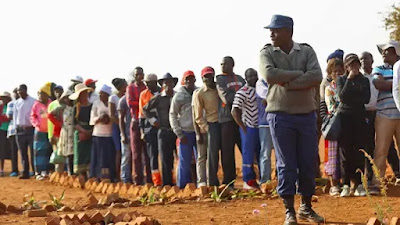
Zimbabweans Vote in Crucial Presidential and Parliamentary Elections Amidst Economic Challenges
Zimbabweans are heading to the polls today to cast their votes in crucial presidential and parliamentary elections. The campaign leading up to the elections has been dominated by the country's soaring inflation, which has had a significant impact on the daily lives of citizens. In an effort to ensure maximum voter participation, the government has declared the election day a national holiday. Incumbent President Emmerson Mnangagwa faces ten challengers, including Nelson Chamisa of the main opposition Citizens Coalition for Change (CCC). The outcome of the election will determine the country's political future, as the winning presidential candidate must secure more than 50% of the vote.
Economic Challenges and Inflation:
Zimbabwe has been grappling with severe economic challenges, including extremely high inflation rates, which have significantly affected the livelihoods of the population. Skyrocketing food and fuel prices, coupled with currency instability, have created immense hardships for ordinary citizens. The soaring inflation has become a central issue in the election campaign, with both candidates being pressured to address the economic crisis and offer viable solutions to alleviate the country's financial burden.
National Holiday to Encourage Voting:
Recognizing the importance of voter participation in shaping the country's future, the Zimbabwean government has declared the election day a national holiday. This move aims to allow the estimated 6.62 million registered voters the opportunity to exercise their democratic rights and cast their ballots. By providing a day off from work and other activities, the government hopes to facilitate widespread participation in the electoral process and ensure a fair and representative outcome.
President Mnangagwa's Challengers:
President Emmerson Mnangagwa, who assumed office in 2017 following the resignation of longtime leader Robert Mugabe, faces stiff competition from ten other candidates vying for the presidency. Nelson Chamisa, representing the main opposition party Citizens Coalition for Change (CCC), is one of the notable challengers. The diverse range of candidates provides voters with various choices, reflecting the desire for change and a vision for a better future for Zimbabwe.
Requirement for Majority Vote:
In order to win the presidency outright, a candidate must secure more than 50% of the vote. If no candidate achieves this threshold, a runoff election will be held between the top two candidates. This requirement underscores the significance of gaining broad support from the electorate and effectively addresses the need for a clear majority consensus to lead the nation.
Conclusion:
Zimbabweans are participating in an important political exercise as they cast their votes in presidential and parliamentary elections. Against the backdrop of economic challenges and soaring inflation, citizens are seeking leadership that can address the pressing issues and chart a path towards stability and prosperity. The declaration of a national holiday demonstrates the commitment to ensuring widespread voter participation. The election results will shape the direction of the country, with the winning candidate tasked with leading Zimbabwe through these difficult times and towards a more promising future.
Disclaimer: The information provided in this article is based on available sources and should not be considered as political advice or an endorsement of any candidate or party. The outcome of the elections will depend on various factors and the will of the Zimbabwean people as expressed through their votes.











.jpg)
.png)

.jpg)
.png)
.jpg)
.jpg)

.jpg)


Join the conversation